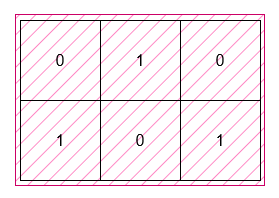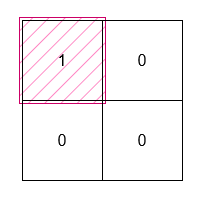Welcome to Subscribe On Youtube
3195. Find the Minimum Area to Cover All Ones I
Description
You are given a 2D binary array grid. Find a rectangle with horizontal and vertical sides with the smallest area, such that all the 1's in grid lie inside this rectangle.
Return the minimum possible area of the rectangle.
Example 1:
Input: grid = [[0,1,0],[1,0,1]]
Output: 6
Explanation:

The smallest rectangle has a height of 2 and a width of 3, so it has an area of 2 * 3 = 6.
Example 2:
Input: grid = [[1,0],[0,0]]
Output: 1
Explanation:

The smallest rectangle has both height and width 1, so its area is 1 * 1 = 1.
Constraints:
1 <= grid.length, grid[i].length <= 1000grid[i][j]is either 0 or 1.- The input is generated such that there is at least one 1 in
grid.
Solutions
Solution 1: Find Minimum and Maximum Boundaries
We can traverse grid, finding the minimum boundary of all 1s, denoted as $(x_1, y_1)$, and the maximum boundary, denoted as $(x_2, y_2)$. Then, the area of the minimum rectangle is $(x_2 - x_1 + 1) \times (y_2 - y_1 + 1)$.
The time complexity is $O(m \times n)$, where $m$ and $n$ are the number of rows and columns in grid, respectively. The space complexity is $O(1)$.
-
class Solution { public int minimumArea(int[][] grid) { int m = grid.length, n = grid[0].length; int x1 = m, y1 = n; int x2 = 0, y2 = 0; for (int i = 0; i < m; ++i) { for (int j = 0; j < n; ++j) { if (grid[i][j] == 1) { x1 = Math.min(x1, i); y1 = Math.min(y1, j); x2 = Math.max(x2, i); y2 = Math.max(y2, j); } } } return (x2 - x1 + 1) * (y2 - y1 + 1); } } -
class Solution { public: int minimumArea(vector<vector<int>>& grid) { int m = grid.size(), n = grid[0].size(); int x1 = m, y1 = n; int x2 = 0, y2 = 0; for (int i = 0; i < m; ++i) { for (int j = 0; j < n; ++j) { if (grid[i][j] == 1) { x1 = min(x1, i); y1 = min(y1, j); x2 = max(x2, i); y2 = max(y2, j); } } } return (x2 - x1 + 1) * (y2 - y1 + 1); } }; -
class Solution: def minimumArea(self, grid: List[List[int]]) -> int: x1 = y1 = inf x2 = y2 = -inf for i, row in enumerate(grid): for j, x in enumerate(row): if x == 1: x1 = min(x1, i) y1 = min(y1, j) x2 = max(x2, i) y2 = max(y2, j) return (x2 - x1 + 1) * (y2 - y1 + 1) -
func minimumArea(grid [][]int) int { x1, y1 := len(grid), len(grid[0]) x2, y2 := 0, 0 for i, row := range grid { for j, x := range row { if x == 1 { x1, y1 = min(x1, i), min(y1, j) x2, y2 = max(x2, i), max(y2, j) } } } return (x2 - x1 + 1) * (y2 - y1 + 1) } -
function minimumArea(grid: number[][]): number { const [m, n] = [grid.length, grid[0].length]; let [x1, y1] = [m, n]; let [x2, y2] = [0, 0]; for (let i = 0; i < m; ++i) { for (let j = 0; j < n; ++j) { if (grid[i][j] === 1) { x1 = Math.min(x1, i); y1 = Math.min(y1, j); x2 = Math.max(x2, i); y2 = Math.max(y2, j); } } } return (x2 - x1 + 1) * (y2 - y1 + 1); } -
/** * @param {number[][]} grid * @return {number} */ var minimumArea = function (grid) { const [m, n] = [grid.length, grid[0].length]; let [x1, y1] = [m, n]; let [x2, y2] = [0, 0]; for (let i = 0; i < m; ++i) { for (let j = 0; j < n; ++j) { if (grid[i][j] === 1) { x1 = Math.min(x1, i); y1 = Math.min(y1, j); x2 = Math.max(x2, i); y2 = Math.max(y2, j); } } } return (x2 - x1 + 1) * (y2 - y1 + 1); }; -
public class Solution { public int MinimumArea(int[][] grid) { int m = grid.Length, n = grid[0].Length; int x1 = m, y1 = n; int x2 = 0, y2 = 0; for (int i = 0; i < m; ++i) { for (int j = 0; j < n; ++j) { if (grid[i][j] == 1) { x1 = Math.Min(x1, i); y1 = Math.Min(y1, j); x2 = Math.Max(x2, i); y2 = Math.Max(y2, j); } } } return (x2 - x1 + 1) * (y2 - y1 + 1); } } -
impl Solution { pub fn minimum_area(grid: Vec<Vec<i32>>) -> i32 { let m = grid.len(); let n = grid[0].len(); let mut x1 = m as i32; let mut y1 = n as i32; let mut x2 = 0i32; let mut y2 = 0i32; for i in 0..m { for j in 0..n { if grid[i][j] == 1 { x1 = x1.min(i as i32); y1 = y1.min(j as i32); x2 = x2.max(i as i32); y2 = y2.max(j as i32); } } } (x2 - x1 + 1) * (y2 - y1 + 1) } }